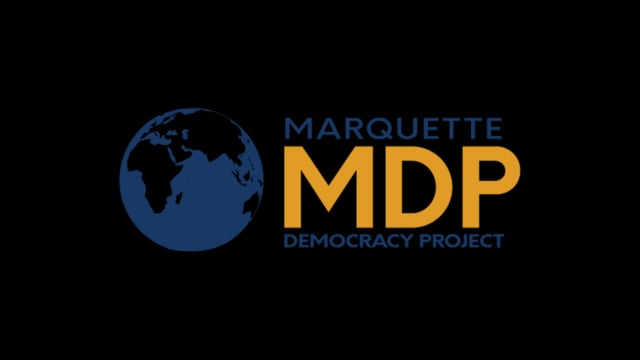Fray Tomas, executive director of la 72, a migrant shelter in Tenosique, Mexico, travels the world to draw international attention to the “tremendous” human rights violations that affect migrants making their way through Central America and Mexico. He is visiting Marquette University this week to share his stories with students and the community as part of the Marquette Democracy Project.
Marquette students Rachel Kiefer, Nicholas Molina, and Dan Noonan interviewed Fray Tomas via Skype prior to his visit, about his work with migrants near the southern Mexican border. (The interview was conducted in Spanish and translated to English.)
With all the difficulties that you face, what motivates you to continue forward?
The motivation comes from the population we serve. I think that because every day I see victims of a politically, economically and socially corrupt system that has taken away their lives, I cannot sit silent. If I listen and do not respond, then I would be an accomplice to this corrupt system. It’s not to say that I am going to resolve all of these problems, but at least I am working for a greater future for these people.
What is your relationship to the Church? Do you receive help?
There are different ways of understanding faith. The Church can question our methods, actions or even what we say about the authorities, but they cannot question our fidelity to the people we serve. A lot of people within the Church will tell us, “You’re doing a great job with what you are doing, but do not speak.” I would tell them, “You can’t silence us because he who does not speak against wrong that is happening is an accomplice of the crimes that are being committed.”
What would you wish would be the greatest impact of the example you’ve tried to set with la 72?
In the short term, I expect absolutely nothing. As we’ve seen, there is an increase in crimes against humanity and against migrants, which will take a very long time to change. I hope that we will create a large impact, not simply in the state of Mexico, but also in the society of Mexico: to fight for the lives of migrants.
Do you think that the Mexican government shares your vision, or do they see migrants as a problem?
Mexico doesn’t want to recognize that there is violence in Central America. For this reason, Mexico has been deporting Central Americans at massive levels. Mexico is a butcher shop for Central Americans. I hate saying this, but this is the truth.
In the past, the civil society in Mexico, like in other parts of Latin America, shared themes of solidarity. Today Mexico has lost this vocation and efforts of solidarity.
Do other Central American governments put pressure on Mexico to protect migrants?
I vividly remember a meeting where I was sitting with government representatives from Mexico and Central America. The first thing Mexico requested was to close borders. The first thing Honduras requested was to open borders in order to allow people to enter Mexico. Trump, of course, denied this request, stating that, “no one goes through.”
Trump refers to all immigrants as Mexican immigrants. What fears do you have that this will influence Mexico, especially the migrants?
Unfortunately, President Trump directs his government from tweets. Through his tweets, he devalues Mexico tremendously. There isn’t always necessarily truth in these tweets. I don’t believe President Trump even thinks about the things he says. So far, no executive orders have been implemented.
Is there anything else you would like to tell us, before we finally get to meet you in person?
I just want to say that I am very excited to be able to come to Marquette. I am very excited that youth in the US are able to recognize what we are living and that we are trying to change the situation and spread the word in order to change society.

